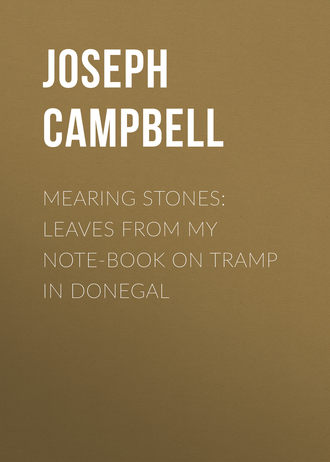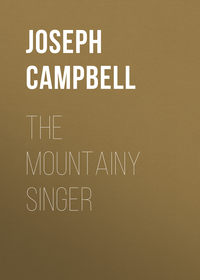 полная версия
полная версияMearing Stones: Leaves from My Note-Book on Tramp in Donegal
THE FLAX-STONE
Outside nearly every house in Donegal – at least in the north-western parts of it – is the Cloch Lín, or “Flax-Stone.” This is a huge wheel of granite, half a ton or more in weight, revolving on the end of a wooden shaft which itself turns horizontally on an iron spike secured firmly in the ground. The purpose it serves is to “break” the flax after it has been retted and dried. On the long arm of the shaft tackling is fixed for the horse supplying the motive power – much in the same way as it is in a pug-mill or puddling machine used in the old days by brick-makers. The flax is strewn in swaths under the wheel, which passes over it repeatedly, disintegrating the fibre. The scutch-mill, of course, is a more expeditious way of doing the work, but Donegal folk are conservative and stick to the old method – which must be as old, indeed, as the culture of flax itself is in the country.
AFTER SUNSET
I was coming through Ardara wood the other evening just after sunset. There was a delightful smell of wet larch and bracken in the air. The road was dark – indeed, no more than a shadow in the darkness; but a streak of silver light glimmered through from the west side over the mountains and lay on the edge of the wood, and thousands of stars trembled in the branches, touching them with strangeness and beauty. As I approached the village I met an old woman – I knew she was old by her voice – who said to me: “Isn’t it a fine evening, that?” “It is,” said I. “And look,” said she, “at all the stars hung up in the trees!” Farther on I came on a number of women and girls, all laughing and talking through other in the half-darkness. I was out of the wood now and almost into the village, and there was light enough to see that they were carrying water – some with one pail, others with two – from the spring well I passed on my way up. This, I believe, is a custom in Ardara.4 The grown girls of the village go out every evening after dark-fall, if the weather happens to be good. They meet at the well, spend half an hour or so chatting and talking together, and then saunter home again in groups through the darkness, carrying their pails, just as I saw them on this particular evening. When I got to the village the windows were nearly all lit up. The white and white-grey houses looked strange and unearthly in the darkness. The doors were open, and one could see a dark figure here and there out taking the air. Over the roofs the stars shone and the constellations swung in their courses – the Dog’s Tail, the Dragon, the Plough, the Rule, and the Tailor’s Three Leaps; and although there was no moon one could see the smoke from the chimneys wavering up into the sky in thin green lines. The fragrance of peat hung heavily on the senses. There wasn’t a sound – only a confused murmur of voices, like the wind among aspen-trees, and the faint singing of a fiddle from a house away at the far end of the street. Even the dogs were quiet. I passed through the Diamond, down the long main street next the shore, and like Red Hanrahan of the stories, into “that Celtic twilight, in which heaven and earth so mingle that each seems to have taken upon itself some shadow of the other’s beauty.”
THE DARKNESS AND THE TIDE
“What time o’ day is it?” My interrogator was an old man I met the other evening in a loaney running down from the back of Lochros to the sands of Lochros Beag Bay, near where the old fish-pass used to be. I looked at my watch, and told him it was five-and-twenty past seven. “Oh,” said he, “is it so much as that? The darkness and the tide’ll soon be coming in, then.”
ERRIGAL
The hill of Errigal climbs like a wave to the sky. A pennon of white cloud tosses on its carn. Its sides are dark. They slope precipitously. They are streaked and mottled here and there with patches of loose stone, bleached to a soft violet colour with rain. Not a leaf of grass, not a frond of fern roots on these patches. They are altogether bare. Loch Nacung, a cold spread of water, gleams at the bottom, white as a shield and green at the margin with sedge. Dunlewy chapel, with its round tower – a black silhouette in the ’tweenlight – and the walls of the Poisoned Glen beyond.
THE SORE FOOT
“It’s a provident thing,” a tramp said to me the other day, “to lay something by for the sore foot.”
ASHERANCALLY
A roar, as of breaking seas. We are approaching the open Atlantic, but though its salt is bitter on our lips, our view is obscured by sand-dunes. Then, as we round a bend in the road, the Fall of Asherancally breaks suddenly on us, tumbling through a gut in the mountainside – almost on to the road it seems. We stand under it. We watch the brown bulk of water dropping from the gut-head and dancing in foam on the rocks a hundred feet below. The roar is deafening. One might shout at the top of one’s voice, and yet not be heard. The air is iridescent with spindrift, which shines in the sun and sprays coolingly on our cheeks. We lean on the bridge parapet, watching and listening.
ORANGE GALLASES
I came across an old man to-day out in Lochros – a shock-headed old fellow in shirt and trousers, carrying water from a spring well near the Cross, and a troop of dogs snapping at his heels. “You don’t seem to be popular with the dogs?” says I, laughing. “Oh, let them snap,” says he. “It’s not me they’re snapping at, but my orange gallases!”
THE HUMAN VOICE
The human voice – what a wonder and mystery it is! “All power,” said Whitman, “is folded in a great vocalism.” I spoke to a man to-day on the roadside, near Maghery. He was a poor, raggedy fellow, with a gaunt, unshaven chin and wild eyes, and a couple of barefooted children played about the mud at his feet. He answered me in a voice that thrilled me – deep, chestfull, resonant; a voice, that had he been an educated man, might have won fame for him, as a politician, say, or a preacher, or an actor. And voices like his are by no means uncommon along the western seaboard of Ireland. Men address you on the road in that frank, human, comrade-like way of Irishmen, out of deep lungs and ringing larynxes that bring one back to the time when men were giants, and physique was the rule rather than the exception. In such voices one can imagine the Fenians to have talked one with the other, Fionn calling to Sgeolan, and Oisin chanting the divine fragments of song he dreamed in the intervals of war and venery. Will Ireland ever recapture the heroic qualities – build personality, voice, gesture – or, as Whitman puts it: “Litheness, majestic faces, clear eyes” – that were hers down to a comparatively late period, and in places have not quite died out even yet? I believe she will.
LOCH ALUINN
A grey loch, lashed into foam by wind from nor’ westward, lapping unquietly among reeds that fringe its margin. Boulders everywhere – erratics from the Ice Age – bleached white with rain. Crotal growing in their interstices, wild-mint, purple orchises and the kingly osmunda fern. A strip of tilled land beyond – green corn, for the most part, and potatoes. Slieve a-Tooey in the distance, a blue shadowy bulk, crossed and recrossed by mist-wreaths chasing one another over it in rapid succession. A rainbow framing all.
THE OPEN ROAD
The open road, the sky over it, and the hills beyond. The hills beyond, those blue, ultimate hills; the clouds that look like hills; the mystery plucked out of them, and lo, the sea, stretching away into the vast – white-crested, grey, inscrutable – with a mirage dancing on its furthest verge!
1
Book of Leinster.
2
He had the Old Age Pension.
3
Cuchulain, the Hound of Ulster, a contemporary of Conchubhair MacNeassa, who was – so tradition has it – born on the same night as Christ.
4
In fact, a “go of water” is a byword there – “Many a girl met her man in a go of water!”


